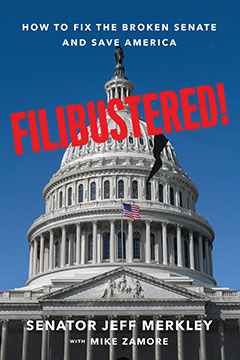Filibustered!
The U.S. Senator from Oregon who is leading the fight to restore the talking filibuster explains how changing just one rule could save our democracy
If we want to fix what ails America, we have to fix the Senate. And if we want to fix the Senate, we must fix the broken filibuster.
In a compelling and powerfully argued book, Senator Jeff Merkley and his longtime chief of staff tell the insiders’ story of how the Senate used to work and how the filibuster came to cripple the self-styled “World’s Greatest Deliberative Body” with paralyzing gridlock. And they make the surprising case that restoring a modified version of the old-style, talking filibuster may just be our democracy’s path back from the brink.
For nearly two centuries, the Senate designed by the Founders served the purpose they envisioned: it was a deliberative legislative body where the nation’s thorniest challenges were hashed out. Senators had the ability to speak at length and offer any manner of amendments to influence bills, and then when all had had a say, the Senate voted. Senators who objected to passing a bill could wage a defiant filibuster—in the spirit of fictional Senator Smith who talked until he collapsed in order to block a corrupt railroad deal in the classic 1939 film Mr. Smith Goes to Washington. But at the end of the day, nearly all legislation, amendments, and nominations went to a vote, and the majority prevailed.
Today, however, thanks to abuse of a fifty-year-old reform intended to make it easier for the Senate to pass legislation, the exceedingly difficult, rare filibuster has morphed, plunging the Senate into dysfunction and threatening the very foundations of our democracy. Now, the minority party can simply declare a “no-talk” filibuster, insisting on a supermajority of sixty votes to pass nearly any bill or a lengthy process to confirm any of the president’s nominees—giving themselves a veto over the majority’s agenda. Wildly popular bills languish, judgeships and administrative posts remain unfilled, but ordinary citizens can’t see why because the obstruction all takes place behind closed doors.
Filibustered! combines a marvelous romp through key moments in filibuster history—from the first filibuster in 1841 through Southern Dixiecrat filibusters of civil rights legislation, up through Mitch McConnell’s transformation of the filibuster into a routine tool of perennial gridlock—with firsthand accounts of recent high-profile legislative fights, and a compelling argument that the key to the Senate’s future may be found in its past.
Praise
|
|



